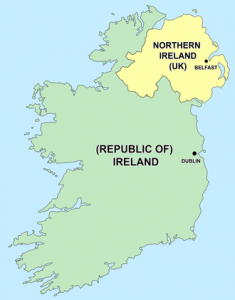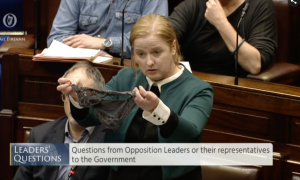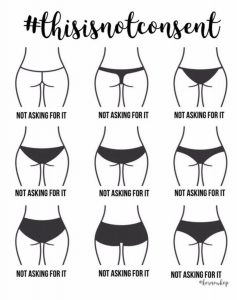I don’t follow the whole Brexit thing too closely because it is way too complicated and I don’t have much of a clue or the motivation necessary to get one. It’s the biggest, hugest mess, and I’m guessing that Theresa May regrets ever getting involved, and the best you can say for it is that every now and then Westminster manages to overtake even America as the world’s laughingstock, which is a welcome diversion. Occasionally it suits us to pay for something in sterling rather than euros, so we wait until Ms May’s done something like called a snap election and bottomed out the economy so we can take advantage of their currency being dead in the water to get a good exchange rate, but beyond that I don’t take much notice.
But this morning she said something that caught my attention. She brought up the idea of using a hard border to force a united Ireland.
As you know, the island of Ireland contains 32 counties. The Republic has 26 and the other six are Northern Ireland.
This partition was agreed on in 1921, with the idea that there would be two self-governing entities, both part of the U.K. After a further civil war in 1922, the Irish Free State was declared in the south, and this later became the Republic.
There have always been people who want to see Ireland reunited which was a big part of the Troubles. For thousands of years it was one country. The problem is, how do you give back something that you took away in the 1600s? The English and Scottish families who settled on confiscated land have now been there for a really, really long time. It was then that English became the language of power in the North and the Irish language began to slip away too. Like the land disputes in Palestine, like the Treaty of Waitangi claims, there’s no good solution. Taking land away from people who own it now to give back to those it was taken from centuries ago isn’t the answer. And land is just one part of it. There’s governance, there’s language, there’s culture, there’s eight-hundred-long-years of wrongs to be righted.
Then along comes Ms May this morning saying that perhaps, rather than go back to a hard border between the Republic and the North, the good people of Ulster would rather throw in their lot with Ireland than with Britain. This has come as quite a surprise to all concerned, not just me, as far as I can tell.
See, the big sticking point so far with the Brexit deal has been trade negotiations and the Republic/North border, being the only land border that Britain has with Europe, is proving especially problematic. In the bad old days there were military checkpoints along the border, customs and excise, and all manner of beaurocracy. Now you don’t even notice when you cross it. There are plenty of people who live on one side and work, or do their grocery shopping, or take their kids to football practice on the other. In January we spent a few days in Derry, Northern Ireland, looking around there and Donegal. Donegal is a bit of an anomaly, being further north than most of Northern Ireland, despite being part of the Republic.
I’ve put a nice white cross so you can see where Derry is (except its’s called Londonderry when you’re there), and Donegal is the green area to the left of it, that whole chunk on its own up there almost cut off from the other 25 Republican counties.
As we drove around, visiting castles and national parks and beaches and things, we changed countries constantly and the only way to tell was by checking which cell phone provider was currently servicing your phone. You’d be looking at the directions on Google Maps and suddenly a different logo would pop up in the top corner. A minute later you’d go around a bend and it’d change back. Five minutes later there it would be again. Petrol stations and shops around there tend to be happy to accept both euros and sterling, they all speak with the same impenetrable accent (‘Lookit da steeit o’ da pleeice! Wouldja sorrit it oat nye!’) and the only thing you have to look out for is that speed limit signs change from miles per hour to kilometres and back again. Apart from that, you travel back and forth between the two countries in blissful ignorance.
People like it this way. There are things that are cheaper up North, and at the moment anyone can take advantage of this. When we discovered how much Josh’s asthma medication costs here, we worked out – in all seriousness – that it would be cheaper to rent a car for the day and drive up to Newry, just across the border and only 90 minutes away on the M1, and stock up there. Fireworks are illegal in the Republic – they have a bit of an aversion to unexpected explodey sounds, and fair play to them – but there are plenty of shops and warehouses in the Northern border towns that offer a great selection. In the weeks leading up to Hallowe’en, the night when every man and his dog in the Republic chucks his old couch and some pallets on an illegal bonfire, sups his illegal poitín and lets off his illegal fireworks, I’m pretty sure the bulk of their business is coming from the southern 26 counties. Not that long ago, of course, it was the only way to acquire not just skyrockets and cheap tellies but also contraception. A while back I was reading the comments to a news story and this guy was reminiscing about the days when he used to do a condom run from Dublin every few weeks. His mother could never understand why, every time he came back from Belfast, the phone was ringing off the hook for the rest of the night.
Nobody wants to go back to the days of border control. Ms May’s theory that, given the choice, people up North might rather just leave the U.K. and rejoin Ireland instead might not be too crazy.
The Irish Republic used to be a country to avoid if you could. I’ve been reading Daniel’s history homework recently as he’s been learning about the government through the middle of last century as it developed from being under British rule, to Free State, to baby Republic, to grown-up Republic, and it’s fascinating, although not to him, unfortunately. For example, the IRA colluded with the Nazis during WWII, because the Nazis thought they were the actual army of Ireland, and the IRA liked Germany’s thinking about England, so there was a fair bit of common ground. What happened when the Nazis finally did their homework about the IRA and realised they’d been catfished, I have no idea. That’s a story for another day. More to the point, some of the history of the young government, in the iron grip of the Church, would make you cry. For example: in the early 50s Dr Noel Browne was Minister for Health, and he was a man who knew what he was doing. At the time TB was killing 3000 people a year. Mr Browne set to and built hospitals, organised mass X-rays, introduced the BCG vaccine and cut the number of deaths from TB to just 300 a year. So this was a guy who you’d think would have some credibility in the matter of health reform. His next proposed initiative was the Mother and Child Scheme, which would give free medical care to all mothers and children under 16. At the time much of the Irish population was poor, rural and uneducated, and you’d have to assume that a measure like this would have made a big difference to the lives of the most vulnerable. However, doctors objected on the grounds that ‘it may affect the doctor-patient relationship’ (they didn’t want to deal with the great unwashed, I’m guessing) and far more importantly the Catholic Church objected as they felt that ‘the state was interfering with private family matters’.
Because if a baby’s going to die of pneumonia or croup or measles it’s God’s will and none of anybody else’s business. I imagine that what they were really scared of was women being given information and help. What if women start understanding how their bodies work? What if they start thinking they’re important and worthy of help? What if they have somewhere to turn when their living conditions are less than ideal? The Church were open about the fact that they didn’t want women receiving ‘non-religious’ medical advice in case it led to the great evil of birth control. There’s a fine art to keeping people under control, and giving them free access to health care clearly wasn’t part of the plan.
The majority in government supported the church – big surprise – and Dr Browne (above, and clearly not over it) resigned, causing his party to lose their majority and the next election. During the fifties Ireland had a huge trade deficit, factories were closing, unemployment was rising and 50,000 people a year were emigrating, and it was a very long time before things started to get better.
So back in the day there would be no reason at all, economically or in terms of standard of living, for the North to choose to be part of the Republic rather than sticking with the U.K. Now, though, things have changed. Ireland’s economy is chugging along just beautifully, whereas Britain is in a bit of a mess. Last Friday Josh and I went to his work Christmas do, held in half of the city’s biggest expo pavilion. There was a full-sized merry-go-round in one corner and it didn’t even take up noticeable space. There was a big dance floor and a variety of DJs and musicians. There was a pamper parlour with hairdressers, massage therapists and ladies who would do you a face painting with glued-on sequins. There was a guy with VR glasses for you to try. There were 2,500 people registered to attend. I looked around and thought, say there are 2,000 here, and say half are Amazon employees (probably conservative, because not every employee would bring a plus-one), and say the average salary is €100,000 (probably also conservative for all I know), then this room right now represents an annual salary pool of €100,000,000. One hundred million euros a year, just for the people in this room. And all over the city, possibly even tonight, Google is doing the same, Microsoft is doing the same, Dell is doing the same, and we’re all going home and putting that money into the economy in the form of Jaffa Cakes and school fees, and that is a big, big amount of money. Lots and lots of it. And for those who don’t work in a tech firm that can afford its own merry-go-round, there are medical cards to get you free health care and all sorts of other necessities.
And of course Ireland will remain in the EU, and there are benefits to that. Economically, but also personally. In 2017 20% of all Irish passport applications were from people in the U.K. and Northern Ireland, who don’t want to lose their right to travel, work and live freely among the EU member states.
So, you know, people up north could do worse than consider Theresa May’s idea. The possibility of reunification is allowed for in the Good Friday Agreement. We all know that she wasn’t serious, just desperate. All her lovely Brexit plans have gone spiraling out of control and she’s using the classic diversion tactic to distract people from the fact that she’s broken the country. Today’s top story is this:
It basically couldn’t be worse. She can’t see any possible way to make the border issue work, so she’s gone off the reservation and said, but what if we don’t even want it to? Let’s just not worry about it at all, and look at this great bright side! You guys can get back together, like you always wanted! You’re welcome!
So, yeah, it’s not a serious suggestion. But I’d never realised that it was even a possibility, something that might someday, for some reason, happen. Now that we can all buy condoms at the local supermarket anyway, maybe it’s not a bad idea.
















